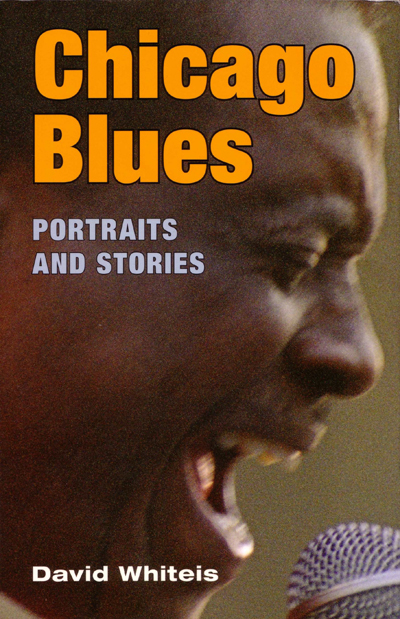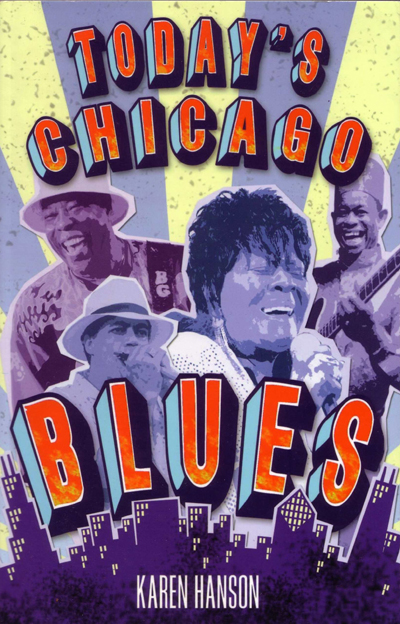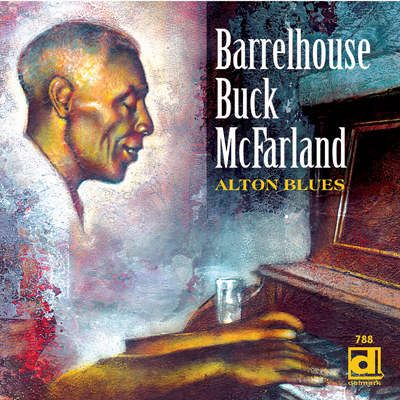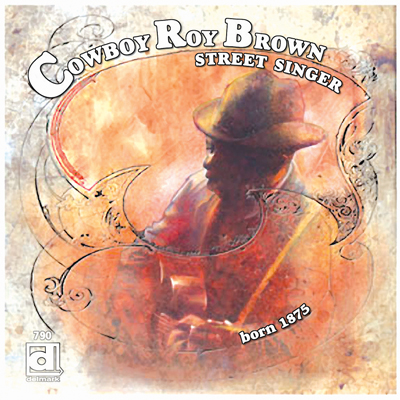| « The Hood, The Bad and The Ugly | Cloud Cult at Schubas (Read Quickly. Don't Linger. Show Starts In 2 Hours) » |
Feature Wed Apr 18 2007
Chicago Blues Reviews
Chicago's blues roots run deep and wide. Here at Transmission, we do a lot more than just listen to the fine music coming out of the city's many blues venues. We now give you four reviews: two focus on new books about Chicago's blues culture recently released by two local publishers, and two take a look at the latest blues recordings put out by an institution of a local music label, Delmark. Enjoy!
Chicago Blues Books make good companions
Chicago Blues: Portraits and Stories by David Whiteis (University of Illinois Press)
Today's Chicago Blues by Karen Hanson (Lake Claremont Press)
Two recently-published books about Chicago blues are worthy additions to anyone's music library, and make good companions to each other on the shelf. Longtime Chicago Reader blues critic David Whiteis has compiled over 20 years of personal experiences with some of the most famous and infamous blues performers into a passionate and poetic tribute, "Chicago Blues: Portraits and Stories". It's separated into 4 parts, and the first, dedicated to elder statesmen of the blues, is by far the most entertaining and interesting, an eloquent, Algrenesque explication of the complex raconteurs and characters of Chicago blues. The other 3 sections are dedicated, respectively, to legendary lounges, younger-generation performers, and the phenomenon known as "soul-blues". Of the 3, the soul-blues section limps the most, perhaps because it's an attempt to intellectually analyze this subgenre, and the other sections are more dedicated to what a blues player would call the "feel" of the subjects. Whiteis is a keen observer, and the portrait of Junior Wells is so touchingly accurate it nearly made me cry remembering one of my favorite blues people. "Blues People", a book written a generation ago by Amiri Baraka (a.k.a. Leroi Jones) in fact, is a good point of reference for this book. Whiteis has a sociological background, and his approach has always been to study blues as a cultural force, not necessarily as a musical one.

That sociological perspective can sometimes blunt the edge of music criticism. There are some very arguable points made in this book — I would take issue with the claim made in the interview with Cicero Blake that the synth-based "southern soul" sound that is currently popular is an aesthetic and not a simply economic choice, for example. However, in the end, this is a book about blues that reads like the blues — deceptively simple, with a passionate, complexity underneath, and it's a fine tribute to Chicago's musical gem.
Karen Hanson's "Today's Chicago Blues", by contrast, is a more dispassionate companion and suffers from all the pitfalls of printed guidebooks — especially in the blues-club world, it's hard to keep information current. Clubs come and go in far less time than a publishing cycle, and to keep up to date, Hanson writes a very informative blog which covers all sorts of local blues news, including scouting new venues.
Hanson's book is fairly comprehensive in scope, and provides a well-researched compendium of Chicago blues information, a sort of localized version of the famous "Blues Who's Who" crossed with a Michelin guide. There's a good overview of Chicago blues history to put today's blues in context, and she catalogs the cultural institutions in town that can also help provide the history of the blues. The bulk of the book is dedicated to an impressive collection of thumbnail biographies of local performers.

The main drawback to this approach is that there isn't a critical component. All blues performers are not equally talented or even performing in the same subgenre, and while one reader might enjoy seeing a modernist like Melvin Taylor and find a traditional Delta player like Honeyboy Edwards boring, another might find just the opposite. Similarly, you can't have a good time at Buddy Guy's Legends if you're only carrying Lee's Unleaded money. Although she catalogs a huge amount of information on clubs and performers, Hanson doesn't provide a lot of guidance that would help a music fan make informed choices. I would have preferred some sort of rating system or some descriptive writing about the clubs that differentiates the "feel" of each club. This is a minor quibble, and at least the author doesn't fall prey to the boosterism that plagues much of blues writing today. If every peforrmer is "legendary", then conversely none of them are.
These two books, taken together, represent the two sides of blues writing today– the passionate, experiential memoir and the drier, more objective catalog. They manage to complement each other well, although I'd like to see a third book that really provides musical criticism, which is under-represented in today's blues journalism. It's a somewhat touchy subject, because any truly critical comments are often seen in the blues community as disrespectful of the heritage of the music, but it's also part of the reason that blues remains a cult music despite the rich panoply of options in Chicago on a daily basis. There are definite qualitative differences amongst the current crop of Chicago-based performers, and for the newbie, seeing the wrong one as an entrée into the blues might turn a potential fan into a naysayer. Blues is no longer in danger of being ignored in Chicago, thanks in part to books like these and the hard work of many cultural institutions, but to keep it vibrant and compelling, a critical context for the music needs to be established and applied, or it will remain a cult phenomenon. Both the Whiteis book and the Hanson book are a good starting point, but there remains a market for a book that tells not only the who, what, and where of the blues, but the which and the why.
-Steve Pasek
Barrelhouse Buck McFarland Alton Blues (Delmark DE 788)
Born in Alton, Illinois, in 1903, Thomas "Barrelhouse Buck" McFarland played all around St. Louis in the 1920s and '30s. But forty-six years from its recording in 1961 has done nothing to diminish this album place in blues history. Bob Koester did a great job and really its only downfall is that it took another four plus decades to let the world hear it.
There is a sweet consistency to these recordings. They move like the Mississippi River on a hot summer day — lazy and inviting. No storm about to hit. No fight to break up in the back of the bar. Just the steady roll of the current rhythm with the bass hand and the light trickle of the top water swirls.

This McFarland treasure mixes instrumentals with some classic blues vocals. There's a smoky presence to McFarland's voice, which fits so well with the rolling bass lines. There were several times listening to this CD I thought I was hearing Brownie McGhee, since the tonal qualities on the singing are so similar between the two artists.
There's an interesting interview track on the album that I can only assume is conducted by Bob and Vivian Oswald, whose home studio provided the venue for these sessions. They talk about the musicians that Barrelhouse Buck used to jam with in St. Louis, Alton and beyond. Peetie Wheatstraw and others enter the conversation with tales of drunken adventures playing together.
This one is a keeper. A historical look into the early 20th century sound, recorded mid-century and released to the public over 100 years after McFarland was born. Boogie-woogie, barrelhouse and blues. What more could you ask for?
Cowboy Roy Brown Sweet Sugar (Delmark DE 790)
I wasn't sure what to think of Cowboy Roy Brown when I first heard this disc, but rest assured I've grown to love him. I wish I could have seen him perform on the street in St. Louis. I'm sure I would have been mesmerized by his story telling and the wide variety of songs he plays. His "band" which consists of his guitar "Baby" and kazoo "Leon" add to the quilt of sounds he turns into pointed musical stories. He also taps rhythms on "Baby" with what sounds like pencils hitting sometimes with the leaded wood and sometimes with the quiet erasers to bust out just enough of a drum fill between guitar riffs.
Born in 1875, Cowboy Roy was pushing eighty when this recording was made, (though he states on St. Louis Blues that he's 85 today) the exact date of the session is unknown. It was either late 1950's or early 1960's. But especially for his age, his personality shines though the recordings. You can practically hear him smile after every kazoo solo or chord strums as he sings the stories.

This isn't the most sophisticated guitar work but the performance is gold. Gospel, traditional, and good ol' fashion cowboy songs. He plays a slew of recognizable songs to please any passerby so they would hopefully toss a coin or two in Baby's case. Songs ranging from "Down By The Riverside" to "She's Too Fat For Me/Beer Barrel Polka" to "Goodnight Irene" you find something you love. Popular songs of his day, still around today bring the charisma of Cowboy Roy Brown to the present. This is well worth a listen and it will bring a smile to your face as if you were watching Cowboy Roy on the street yourself.
-Carey Eyer















